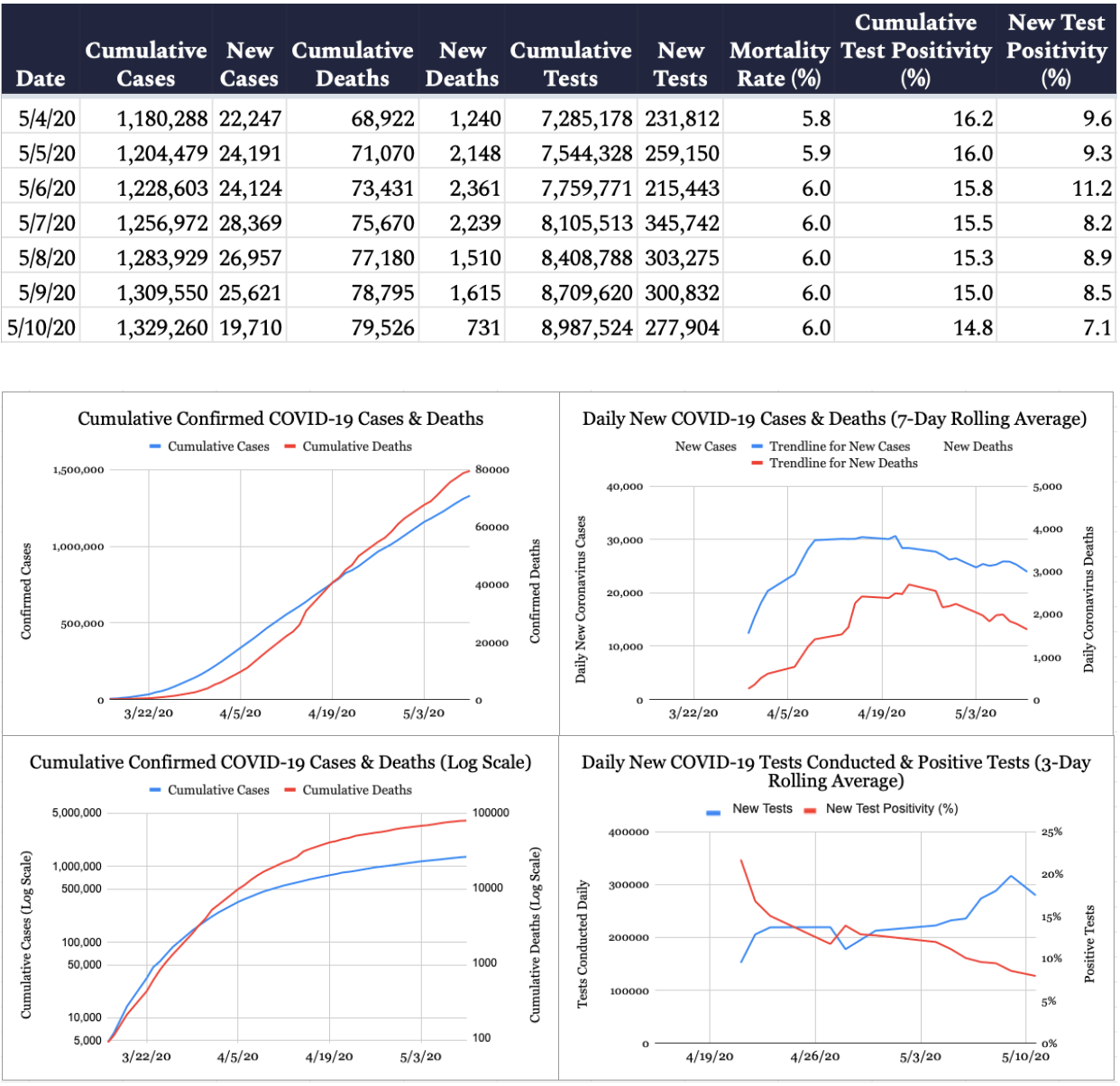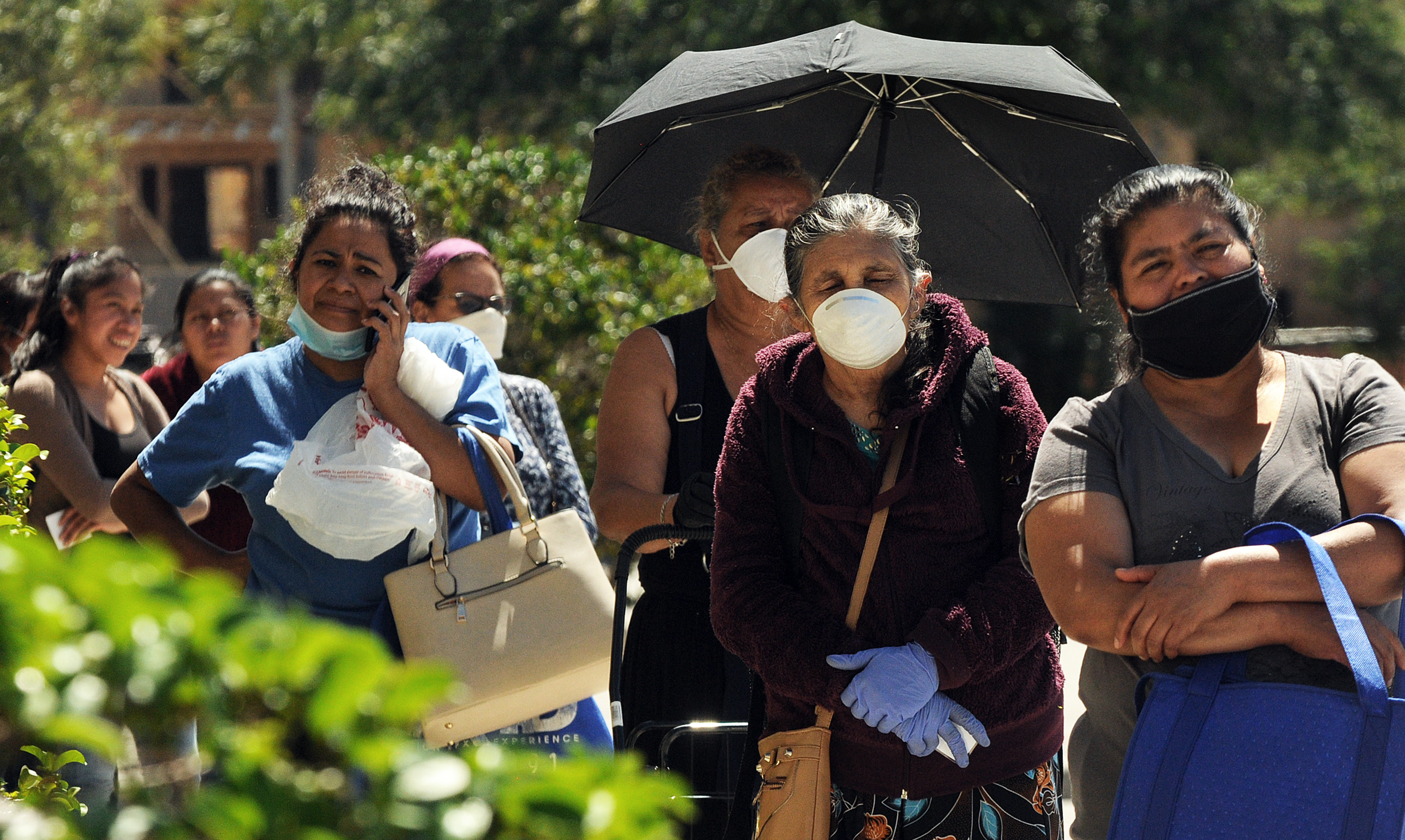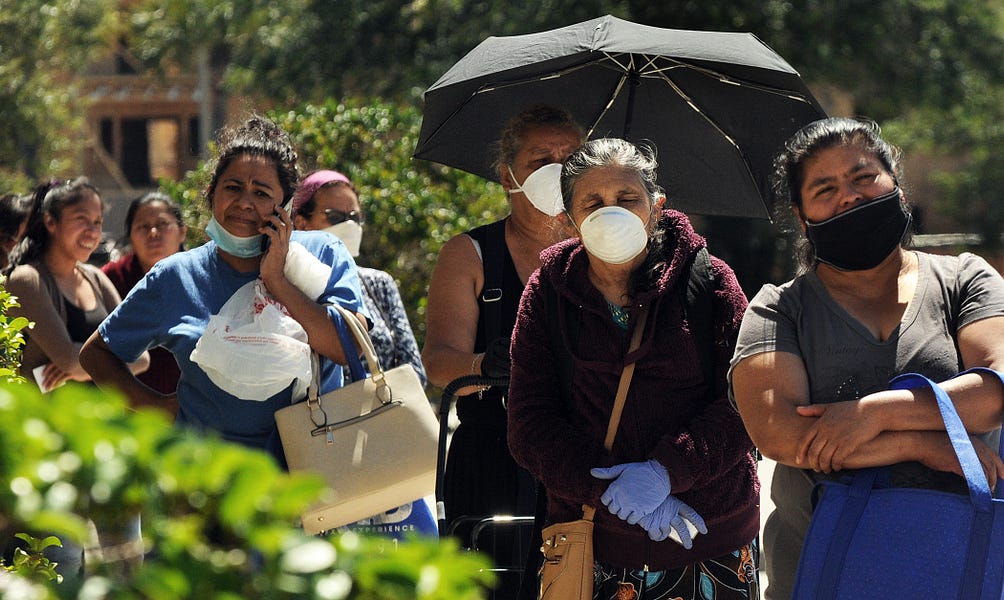Happy Monday! We hope all the mothers out there had the wonderful day they deserved yesterday.
Quick Hits: Today’s Top Stories
-
As of Sunday night, there are now 1,329,260 confirmed cases of COVID-19 in the United States (an increase of 19,710/1.5 percent from yesterday) and 79,526 deaths (an increase of 731/0.93 percent from yesterday), according to the Johns Hopkins University COVID-19 Dashboard, leading to a mortality rate among confirmed cases of 6 percent (the true mortality rate is likely lower, but it’s impossible to determine precisely due to incomplete testing regimens). Of 8,987,524 coronavirus tests conducted in the United States (277,904 conducted since yesterday), 14.8 percent have come back positive.

-
The unemployment rate reached 14.7 percent in April, per the Labor Department’s monthly Employment Situation Summary, and nonfarm payroll employment fell by 20.5 million. Both are records since at least the Great Depression, but lots of experts believe the survey does not even capture the full extent of the economic carnage. “Unemployment rates … I think will climb up towards 20 percent by next month,” White House economic adviser Kevin Hassett told CBS News on Sunday.
-
The Libertarian Party will choose its presidential and vice presidential candidates at a virtual meeting over Memorial Day weekend, canceling the in-person gathering it had planned for Austin and rescheduling the “business” parts of the convention for July in Orlando, Florida.
-
A senior aide to Vice President Mike Pence tested positive for the coronavirus last week. Several members of the coronavirus task force—Dr. Anthony Fauci, CDC Director Robert Redfield, and FDA Commissioner Stephen Hahn, among them—are now entering self-quarantines after possible exposure to the virus. Fauci, Redfield, Hahn, and Adm. Brett Giroir from the Department of Health and Human Services are slated to testify before the Health, Education, Labor and Pensions Committee on Tuesday via videoconference.
-
Google and Facebook have announced that the majority of their employees will continue to work from home through the end of the year.
-
South Korea, an early success story in the containment of coronavirus, saw its largest one-day increase in cases in the last month, with 50 cases traced to a bar-hopping young man in Seoul.
-
Georgia Attorney General Chris Carr requested on Sunday that the Department of Justice look into the handling of the Ahmaud Arbery case.
-
Rock ‘n’ roll artist “Little Richard” (Richard Penniman) died on Saturday morning at the age of 87. Magician Roy Horn—of Siegfried & Roy—died on Friday from COVID-19 complications at the age of 75.
A Crushing Labor Department Survey

We wish this weren’t a thing we had to do regularly, but it’s time for another monthly rundown of the latest grisly pandemic-caused economic data. On Friday, the Bureau of Labor Statistics reported that the U.S. economy lost a staggering 20.5 million jobs in April—a single-month drop orders of magnitude larger than any previous month on record. Since February, unemployment has skyrocketed from a half-century low of 3.5 percent to 14.7 percent.
That doesn’t even tell the whole story: As economist Abby M. McCloskey notes in a piece at the site today, the U-6—a metric that takes into account those who have stopped looking for work and those whose hours have been reduced—hit a mind-boggling 22.8 percent in April.
These sort of figures are basically impossible to put into context in a way that communicates their breadth and scope. But this should give you an idea: Between the end of the Great Recession and February of this year, the U.S. economy added 22.8 million jobs. (That’s not a typo, just a coincidence.) Ten years of steady, solid, often excellent growth—10 years of booming markets and largely cheery economic times—all evaporated in just two months.
And we’re not done. Treasury Secretary Steve Mnuchin told Fox News yesterday that “the reported numbers are probably going to get worse before they get better.”
We knew before that ethnic minorities have been hit disproportionately hard by COVID-19. It’s now increasingly clear that black and Hispanic Americans are getting hammered economically, too, as White House economic adviser Kevin Hassett said on Face the Nation Sunday.
“The African-American community and the Hispanic-American community have been hit especially hard by this jobs report with both of those communities, which were really experiencing record low unemployment rates even in January, seeing massive, massive increases in unemployment,” Hassett said. “You know, right now, looking across the U.S., there are more than 30 million people that are getting initial claims for unemployment insurance. That’s the biggest negative shock to the jobs market that we’ve seen since World War II.”
If there’s a hint of good news in these numbers, it’s the fact that most workers still hope to go back to the job they had before within a matter of months.
“There are a lot of economic differences between right now and the Great Depression,” Hassett said. “Here, we understand why the economy is slowing down. And we expect that we can reverse it. Whereas in the Depression, there were a lot of other things, a lot of policy errors and so on, that made the whole thing drag out. So I think if you look at the Congressional Budget Office, they currently forecast that the second half of the year will be one of recovery. You know, God willing, that’s what’s going to happen.”
But that still leaves the question of how Americans are expected to weather the damage in the meantime—and there’s little news on that front so far. Talks about another round of economic stimulus have largely stalled out in Congress, with President Trump dismissing Democrats as “stone cold crazy” and Nancy Pelosi working on a new stimulus package with no input from Republicans and no chance of passing.
When Will Sports Come Back?
Yesterday, the Washington Post published a column that ostensibly served no purpose other than to accumulate what’s known in the biz as “hate clicks.”
Because the fact of the matter is—for millions of Americans—the absence of sports these past several months has been difficult. Near-home confinement is never a preferred outcome. But it’d certainly feel less monotonous with a slate of playoff basketball games or the intensity of the Stanley Cup playoffs in hockey to look forward to each night.
With that in mind, let’s take a look at where things stand with respect to the major sports leagues and their plans (or lack thereof) to continue play. Any proposal to resume seasons—across sports—assumes no fans will be in attendance, both because packed stadiums would violate states’ social distancing mandates and because 72 percent of Americans said they would not return to a professional sporting event until they’ve been vaccinated.
-
National Basketball Association
The NBA’s story has arguably best mirrored that of the coronavirus pandemic on the whole. The Utah Jazz’s Rudy Gobert testing positive back on March 11—followed moments later by a suspension of the entire basketball season—was, for many people, a wakeup call as to the seriousness of the virus. Two months later, ESPN’s Last Dance documentary on Michael Jordan and the world champion Chicago Bulls teams of the 1990s—airing two hours at a time on Sunday nights—is the closest remaining thing to appointment viewing we have left.
As for a continuation of the 2020 season, the situation remains—unsurprisingly—murky. Commissioner Adam Silver held a call with the league’s players on Friday, the details of which were secured by The Athletic’s Shams Charania. Silver apparently admitted that the NBA “couldn’t start now even if we wanted to,” but added that the league is looking at holding games in two locations—Walt Disney World and Las Vegas—to avoid excess travel. The league is anticipating a second wave of the virus, and officials been debating the idea of pushing back the start of next season until Christmas, even if they manage to squeeze the 2020 playoffs in over the summer.
In response to the million-dollar question—what happens if the NBA resumes play and a player tests positive—Silver said “he hopes the NBA will be able to administer daily testing at that point, have no stoppage of play, and isolate the player(s) in quarantine.”
-
Major League Baseball
MLB was not far behind the NBA in closing up shop back in March—in fact, less than 24 hours passed between the two suspensions. Baseball was in the midst of its annual spring training—with teams dispersed across Arizona and Florida—when the news came down that the regular season would not kick off on March 26 as anticipated.
Momentum toward a condensed summer of America’s pastime seems to be building—even Dr. Anthony Fauci himself seems to think some sort of modified version of the game would be not only feasible, but welcome.
According to baseball insider Ken Rosenthal, MLB’s 30 owners are set to hammer out the final details of a proposal later today that will then be presented to the players’ union tomorrow. Some teams, per ESPN’s Jeff Passan, are telling their players to begin ramping up baseball activity in anticipation of a resumption. The plan is still subject to change, of course, but the rough outline would have the regular season up and running by early July, with teams playing approximately 80 games (half the usual 162) on a regionally adjusted basis to avoid flights and cross-country trips. The playoffs would be expanded from 10 teams to 14.
In the meantime, however, the Korean Baseball Organization is proving a formidable replacement.
-
National Football League
In many ways, the NFL has proven the luckiest of the major sports leagues. Its season wrapped up with the Kansas City Chiefs defeating the San Francisco 49ers in early February, just weeks before the virus became widespread. In the months since, the league has forged ahead with nearly all of its scheduled activities and festivities: The annual free agency period opened in mid-March as planned, and—though it took place on Zoom and not the Las Vegas strip—the NFL draft continued apace, met with record ratings.
Last Thursday, the league plowed ahead with a three-hour TV special releasing the 2020 schedules for all 32 NFL teams. The first regular season game—between the Chiefs and the Houston Texans—kicks off on September 10. One interesting wrinkle: the league ensured all Week 2 opponents also share a bye week later in the season—it could come in handy if everything needs to be pushed back a week or two.
-
PGA Tour
The PGA Tour is set to make a comeback on June 11 in Fort Worth, Texas for the Charles Schwab Challenge.
-
NASCAR
NASCAR will return this Sunday, May 17, with a race at Darlington Raceway in South Carolina.
Worth Your Time
-
Andy Ferguson is one of the finest writers in the country and literally everything he writes is “worth your time,” including this gem in The Atlantic. At 12:09 p.m. Saturday, the president tweeted, with apparent enthusiasm, “TRANSITION TO GREATNESS!” The meaning left observers on all sides perplexed. But not Ferguson. Six hours earlier, at 6:30 a.m., The Atlantic published his latest, a detailed analysis of Trump’s latest “word lumps,” including the newest favorite: transition to greatness. Trump had been using the phrase, or versions of it, for several days before he celebrated it at an event with congressional Republicans. “He used the phrase ‘transition to greatness’ a couple of times, rolling it on the tongue like a fine swig of Diet Coke. Then he pretended he had just thought it up on the spot, right there and then… ‘It’s a great term,’ he said. ‘It just came out, at this meeting. That’s right, it came out by accident. It was a statement, and it came out, and you can’t get a better one. We could go to Madison Avenue and get the best, the greatest geniuses in the world to come up with a slogan, but that’s the slogan we’re going to use: transition to greatness.’ The wellsprings of creativity are mystifying, and the Republicans must have been pleased to be witnesses to history. But not as pleased as the president himself, topping even the greatest geniuses in the world with his inspiration—if he did say so himself. And he did.”
-
In times of great national crisis, Americans have often set aside partisan differences to band together against a common threat. In his latest piece for National Review, Kevin Williamson walks through how our recent national inability to achieve consensus on anything—not policy prescriptions, not principles, not even the barest, plainest facts—has prevented a similar drawing-together against the virus, and how that fact has hamstrung our response from the very beginning. “With the economy cratering, unemployment at unthinkable highs, tens of thousands dead and thousands more to die, it is almost impossible to write this, but: We are lucky that this epidemic is not a great deal worse than it is, because we are not ready for it and do not seem to have the capacity to get ourselves ready for it.”
-
Michigan Republican Senate candidate John James laid out his approach to Donald Trump in a discussion with the state’s black leaders: “I do recognize that it’s human to disagree with people and like I’ve said millions of times, I can agree with the president without worshiping him. I can disagree without attacking him,” James said, in a recording of the private video call obtained by Politico. James, a 38 year-old Iraq War veteran who is black, has been competitive in early polling of his general election matchup with Sen. Gary Peters. James has also shown impressive fundraising ability in what is likely to be a competitive state in the presidential contest, too. Trump has endorsed James, but Trump advisers have worried that his presence on the ballot could hurt Trump’s chances in the state.
Presented Without Comment
Also Presented Without Comment
Also Also Presented Without Comment
Toeing the Company Line
-
In his latest Sunday French Press, David discusses his recent debate with prominent Evangelical theologian Eric Metaxas, objecting to his argument that Trump has “shamed the church” for its ineffectiveness by teaching it how to fight again. He argues that the gospel of life isn’t just a set of policy goals: It’s an ethos, and one which we set aside at our peril. “There is no such thing as hate in the name of life. There is no such thing as malice in the name of life. In fact, hate, cruelty, and malice are antithetical to the Gospel of life. Let’s put it this way—opposition to abortion may be moral, but opposing abortion cannot justify immorality. A believer in the Gospel of life should be marked by character and conduct that reaches far, far beyond taking the right position in public policy debates about abortion rights.” Read it all here.
-
Jonah’s Friday G-File contains two important things: an “indefensibly self-indulgent digression” (his phrase!) on the subject of panda public relations (clocking in at a svelte 1,200 words), and an interesting meditation on what pandemic life teaches us about the concept of social capital. “The Janus-faced monster of the economic calamity and the pandemic are a powerful test of our social capital, at the macro and micro level. So far, I think that we’re passing the test. … What worries me is that I don’t know how long it can last.” Read it all here, and then listen to Jonah riff about it in podcast form here.
-
You’ve been getting Thomas Joscelyn’s Vital Interests newsletter in your inbox for months—do you want to hear what he sounds like? Now’s your chance: He joined Sarah and Steve on the latest Dispatch Podcast to talk China, the Afghanistan exit deal, and the differences between the Trump administration’s foreign policy and a potential Biden doctrine. And when Sarah’s cat walked across the screen on a video call, Joscelyn noted: “Oh, and by the way, jihadis are obsessed with cats.”
Let Us Know
If you could only get one sport back in 2020, which would it be and why?
Your young Morning Dispatchers are MLB fans—but it sure is hard to miss out on the Summer Olympics.
Reporting by Declan Garvey (@declanpgarvey), Andrew Egger (@EggerDC), Sarah Isgur (@whignewtons), and Steve Hayes (@stephenfhayes).
Photograph by Paul Hennessy/Echoes Wire/Barcroft Media/Getty Images.






Please note that we at The Dispatch hold ourselves, our work, and our commenters to a higher standard than other places on the internet. We welcome comments that foster genuine debate or discussion—including comments critical of us or our work—but responses that include ad hominem attacks on fellow Dispatch members or are intended to stoke fear and anger may be moderated.
You are currently using a limited time guest pass and do not have access to commenting. Consider subscribing to join the conversation.
With your membership, you only have the ability to comment on The Morning Dispatch articles. Consider upgrading to join the conversation everywhere.